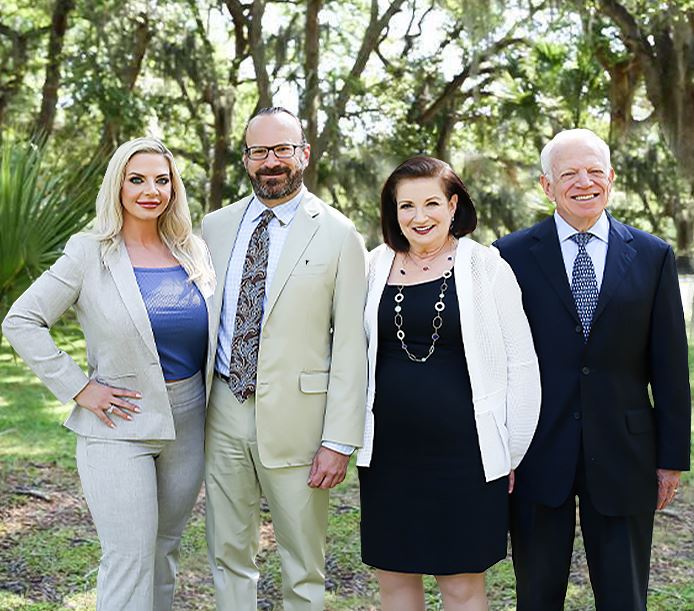
Jacksonville Divorce Attorney
Divorce (Dissolution of Marriage)
Divorce in Florida is called a "dissolution of marriage." To qualify for a divorce, one of the parties must prove that the marriage is "irretrievably broken." This simply means that the relationship cannot be fixed. Florida divorces are "no fault" and uncontested divorces may be deemed irretrievably broken by the statements of the divorcing parties. If a divorce is contested, however, proof the relationship is broken will need to be given. This is where having an experienced divorce attorney becomes important.
Divorce in Florida
Divorce can be a challenging and emotionally charged journey, particularly when it comes to handling the legalities involved. At our firm, our seasoned Jacksonville divorce lawyers are dedicated to guiding you through every step of the divorce process in Florida, safeguarding your rights and interests throughout.
Key aspects of the divorce process in Florida include:
- Filing for divorce: Understanding the residency requirements and filing the necessary paperwork to initiate the divorce proceedings.
- Division of assets: Determining how marital property and assets will be divided, including real estate, financial accounts, and personal belongings.
- Child custody and support: Establishing a parenting plan and determining child support arrangements if there are children involved.
- Alimony: Addressing spousal support and determining whether alimony is appropriate in your situation.
- Mediation and litigation: Exploring options for resolving disputes through mediation or, if necessary, through litigation in court.
Our team is dedicated to providing compassionate and knowledgeable legal representation to help you navigate the divorce process with confidence and peace of mind.
How to File for Divorce in Florida
You'll need to file a divorce petition with the court to begin the process. You can do this online or in person. Once you've filed the petition, your spouse will have 20 days to respond. If you need help with any part of this process contact one of our knowledgeable Family Law attorneys to evaluate your case.
Types of Divorce in Florida
- Uncontested Divorce: An uncontested divorce happens when both parties agree on all major issues, such as property division, alimony, child custody, and support. It is often quicker and more affordable than a contested divorce. In an uncontested divorce, the couple files joint papers and provides necessary documentation to the court, which typically makes the final decision without a lengthy trial.
- Contested Divorce: In a contested divorce, the couple cannot agree on one or more key issues. This can involve disputes over property division, alimony, child custody, and support. A contested divorce may require multiple hearings, negotiations, and potentially a trial. The process is often more time-consuming and costly. Both parties present their case, and the judge makes a final decision on unresolved matters.
- Simplified Divorce: A simplified divorce is an option for couples who meet specific criteria. To qualify, both spouses must agree on all issues, have no minor children, and meet residency requirements. The process is streamlined, which can save both time and money. A simplified divorce is less formal and typically doesn’t require the couple to appear in court.
Property Division in Florida
Equitable Distribution: Florida follows the principle of equitable distribution when dividing marital property. This means assets are divided fairly, but not necessarily equally. Factors such as each spouse's financial contribution, the duration of the marriage, and the economic situation of each spouse are considered in determining an equitable division.
Separate vs. Marital Property: Marital property refers to assets acquired during the marriage, while separate property includes items owned before marriage or received as gifts or inheritance. Courts distinguish between these types of property to ensure that only marital property is divided. Separate property usually remains with the spouse who owns it.
Child Custody and Parenting Plans
Legal and Physical Custody: Legal custody refers to the right to make important decisions about the child’s welfare, including education, healthcare, and religion. Physical custody refers to where the child lives. In Florida, both types of custody can be shared between parents or awarded to one parent, depending on the child's best interests.
Creating a Parenting Plan: A parenting plan outlines how parents will share responsibility for raising their child. It includes visitation schedules, decision-making responsibilities, and guidelines for communication. The court may help create a parenting plan if parents cannot agree. The goal is to ensure the child’s well-being and stability.
Relocation and Custody: If a parent wishes to move out of state with the child, the court must approve the relocation. The relocating parent must provide notice to the other parent and demonstrate that the move is in the child’s best interests. If the other parent objects, the matter may need to be resolved in court.
Child Support in Florida
How Child Support is Calculated: Florida calculates child support based on both parents' income and the number of children. The formula includes guidelines for determining a fair amount of support. Other factors, such as healthcare costs, childcare, and the child’s needs, may also be considered when determining the final amount.
Modifying Child Support Orders: Child support orders can be modified if there is a significant change in circumstances. This could include a change in the parent’s income, a change in custody, or a change in the child’s needs. To modify support, the parent seeking the change must file a petition with the court and provide evidence of the changed circumstances.
Why Choose Our Jacksonville Divorce Lawyers
If you're considering getting divorced in Jacksonville, Florida, you'll need to work with a divorce lawyer to ensure the process goes smoothly. While you can represent yourself in court, it is generally not recommended.
When you are looking for a Florida divorce attorney to represent you in a divorce proceeding, contact Zisser Frazier Family Law at 904-395-2044.

Mediation vs. Litigation: Choosing the Right Path for Your Divorce
Navigating a divorce requires careful consideration of the most effective methods for resolving disputes and finalizing a settlement. At Zisser Frazier Family Law, our knowledgeable Jacksonville divorce lawyers are here to help you understand the distinctions between mediation and litigation, providing guidance to select the best path for your specific circumstances.
Mediation
- Collaborative and cooperative process
- Less adversarial than litigation
- Can result in a more amicable and cost-effective resolution
- Allows both parties to have more control over the outcome
Litigation
- Formal legal process involving court hearings and a judge's decision
- May be necessary in cases of high conflict or complex issues
- Can provide a clear resolution when parties are unable to reach an agreement
- Legal representation is crucial for navigating the court system
Our team is dedicated to helping you navigate the divorce process with compassion and expertise, whether through mediation or litigation. Contact us to schedule a consultation and discuss your options.
Protect Your Assets During Divorce
Divorce can be a complex and emotionally challenging process, especially when it comes to dividing assets and property. At Zisser Family Law, our experienced Jacksonville divorce attorneys are here to help you navigate this aspect of your divorce and ensure that your assets are protected.
Here are some key points to consider when it comes to protecting your assets during divorce:
- Understanding Florida's laws: Florida follows the principle of equitable distribution, which means that marital assets are divided fairly but not necessarily equally. Our knowledgeable attorneys can guide you through the specific laws and regulations related to asset division in Jacksonville.
- Identifying marital and separate property: It's important to distinguish between marital property (assets acquired during the marriage) and separate property (assets acquired before the marriage or through inheritance or gift). We can help you determine what qualifies as marital property and what is considered separate.
- Valuing assets: Properly valuing assets is crucial for a fair division. Our team can assist in assessing the value of various assets, including real estate, investments, business interests, and retirement accounts.
- Negotiating settlements: We are skilled negotiators who will work tirelessly to protect your interests during settlement discussions. Our goal is to achieve a fair and favorable outcome that preserves your financial well-being.
- Enlisting experts: In complex cases, we may collaborate with financial experts, appraisers, and forensic accountants to ensure a thorough evaluation of your assets and to strengthen your case.
By choosing Zisser Family Law, you can have peace of mind knowing that your assets are in capable hands. Our team is dedicated to providing personalized and strategic legal representation to protect your financial future. Contact us today to schedule a consultation.
Frequently Asked Questions (FAQs) About Divorce in Florida
- How long does the divorce process take in Florida?
The duration of a divorce in Florida varies depending on whether it’s contested or uncontested. Uncontested divorces can be completed in a few months, while contested divorces may take a year or more, depending on the complexity of the issues involved. Factors such as court schedules, mediation, and settlement negotiations can influence the timeline. - Do I need to prove fault in a Florida divorce?
No, Florida is a "no-fault" divorce state. This means that neither spouse needs to prove that the other spouse was at fault for the breakdown of the marriage. The only requirement is that the marriage is "irretrievably broken," meaning there is no chance of reconciliation. - Can I get divorced if my spouse doesn’t agree?
Yes, you can still get a divorce even if your spouse does not agree. If your spouse refuses to cooperate, the divorce can become contested. In this case, the court will intervene to make decisions on contested issues such as property division, alimony, and custody. - How is child custody decided in Florida?
In Florida, child custody decisions are based on the child’s best interests. The court considers factors such as the emotional bonds between the child and each parent, the parents' ability to cooperate and make joint decisions, and the child’s living situation and needs. Florida law encourages shared parental responsibility, but sole custody may be awarded in certain situations, such as when one parent is unfit. - Is alimony automatically awarded in a Florida divorce?
Alimony, or spousal support, is not automatically awarded in Florida. It depends on factors such as the length of the marriage, the financial and emotional needs of the spouse requesting support, and the other spouse’s ability to pay. Alimony can be temporary, permanent, or rehabilitative, depending on the circumstances.
When you are looking for a Florida divorce attorney to represent you in a divorce proceeding, contact Zisser Frazier Family Law at 904-395-2044.

Types Of Practice Areas We Commonly Handle
Contact Zisser Frazier Family Law
Hire an attorney who knows the field and knows how to help you.
















